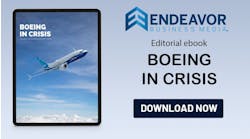“I Tremble for My Country.”
When Thomas Jefferson wrote those words in Notes on the State of Virginia in 1785, some sixteen years before he became the third president of the United States, he was addressing both the reality and the morality of slavery in his home state. And he was troubled.
Two hundred thirty-one years later, in this election year for the forty-fifth president of the United States, we might tremble for a community far larger than a single state, for a country of 50 states emotionally and philosophically divided by race, gender, faith, income, and fear, and seemingly disengaged from the nature of truth.
In our public and our private lives, in our businesses and in our governments, truths these days are less than self-evident. Accusation, innuendo, insinuation, and just plain lies seem to be the new truths. Indeed, too often in the economic, political, and social history of the United States during the past fifty years, new truths have proven to be extraordinary untruths, lies in search of facts that have not and never will exist. Untruths that hold people’s lives hostage. Untruths that can and do change what we think and how we think about the present. Untruths that have re-written lessons of history.
None of these has been for the better of humankind, for truth denied, dismissed, or deferred benefits no one—no individual, no organization, no nation.
This issue before us is not whether a truth is convenient or inconvenient. The issue is that truth must be just that—truth as best we know it. For it is truth that engenders trust. It is truth that passes understanding. It is truth that brings us together. It is truth from which enlightened principles are formed and practiced. And, ultimately, it is truth that makes us free.
The 2016 American presidential primary campaigns are completed. The general election for a new president of the United States will be completed in fewer than 100 days. And then all the issues, all the divisions, and all the disparaging remarks will go away. The truth is they will not. Nor must our concern about truth.
... if we fail to challenge our thinking periodically, we in the United States risk demagogues of the right and the left exceeding the demagogues of the past in both reach and grasp.."
The truth is that in all aspects of our lives, if we fail to ask questions continually and seek answers, if we fail to seek counsel outside ourselves and our circles of life, if we fail to challenge our thinking periodically, we in the United States risk demagogues of the right and the left exceeding the demagogues of the past in both reach and grasp.
And at that prospect, we should surely tremble for our country.
This is another in a series of occasional essays by John S. McClenahen, an award-winning writer who for four decades covered international economics, public policy, and management principles for IndustryWeek.



